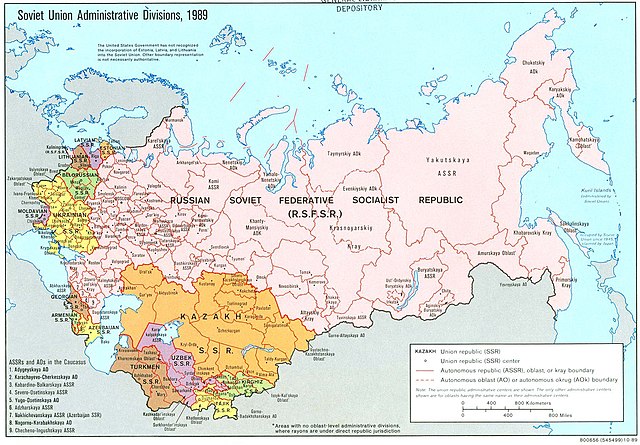Top Qs
Timeline
Chat
Perspective
Great Russian chauvinism
Ideology From Wikipedia, the free encyclopedia
Remove ads
Great Russian chauvinism (Russian: великорусский шовинизм, romanized: velikorussky shovinizm) is a term defined by the early Soviet government officials, most notably Vladimir Lenin, to describe an ideology of the "dominant exploiting classes of the nation, holding a dominant (sovereign) position in the state, declaring their nation as the "superior nation". Lenin promoted an idea for the Bolshevik party to defend the right of oppressed nations within the former Russian Empire to self-determination and equality as well as the language-rights movement of the newly formed republics.
This article needs additional citations for verification. (August 2025) |
Remove ads
Definition
According to Bolshevik vocabulary, the Great-Russian chauvinism is a part of more common Great-Power chauvinism or chauvinism in general. As the Great Soviet Encyclopedia (GSE) says, Great-Power chauvinism is an ideology of the "dominant exploiting classes of the nation, holding a dominant (sovereign) position in the state, declaring their nation as the 'superior' nation". The GSE defines chauvinism as an extreme form of nationalism and acknowledges the existence of great-national chauvinism in the Russian Empire as well as other countries across the globe.
Usage of the word "Great" there traces back to the triune nation concept which was dominating during the imperial era. Modern Russians were referred to as "Great Russians", while Ukrainians and Rusyns were named "Little Russians", and Belarusians were named "White Russians", resembling traditional historical and geographical division of the country's core (compare Greater and Lesser Poland).
Remove ads
Usage
Summarize
Perspective
Following the October Revolution, in September, 1922 Lenin wrote a letter to the Politburo stating, "we consider ourselves, the Ukrainian SSR, and others equal and enter with them on an equal basis into a new union, a new federation, the Union of the Soviet Republics of Europe and Asia".[1] Lenin also promoted an idea for the Bolshevik party to defend the right of oppressed nations within the former Russian Empire to self-determination and equality as well as the language-rights movement of the newly formed republics.[1]
Moreover, in December 1922 Lenin in his letter "What practical measures must be taken in the present situation?" wrote, "...Thirdly, exemplary punishment must be inflicted on Comrade Ordzhonikidze (I say this all the more regretfully as I am one of his personal friends and have worked with him abroad) and the investigation of all the material which Dzerzhinsky's commission has collected must be completed or started over again to correct the enormous mass of wrongs and biased judgments which it doubtlessly contains. The political responsibility for all this truly Great-Russian nationalist campaign must, of course, be laid on Stalin and Dzerzhinsky."[2]

At the 12th Congress of the RCP(b) Nikolay Bukharin stated: “We, [ethnic Russians] as a former great-power nation, must put ourselves in an unequal position. Only with such a policy, when we artificially put ourselves in a position lower than others, only at this price can we buy the trust of formerly oppressed nations."[3]
In all of Stalin's speeches on the national question at party congresses (from the 10th to the 16th), the Great-Russian chauvinism was declared the main danger to the Soviet state. But over time, yielding to the requirements of the newly created super-centralized structures of the Union government, the thesis was forgotten and the indigenous languages were relegated to the background, while Russian became the single language of office.
Remove ads
See also
References
External links
Wikiwand - on
Seamless Wikipedia browsing. On steroids.
Remove ads